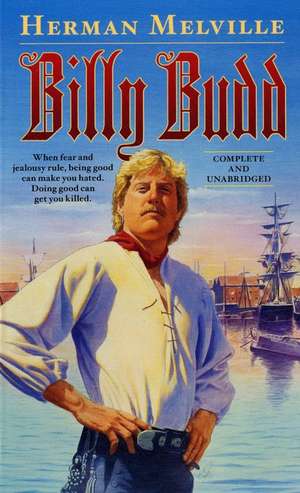Billy Budd: Tor Classics
Autor Herman Melvilleen Limba Engleză Paperback – 30 apr 1992 – vârsta de la 10 până la 13 ani
Tor Classics are affordably-priced editions designed to attract the young reader. Original dynamic cover art enthusiastically represents the excitement of each story. Appropriate "reader friendly" type sizes have been chosen for each title--offering clear, accurate, and readable text. All editions are complete and unabridged, and feature Introductions and Afterwords.
This edition of Billy Budd includes a Foreword, Biographical Note, and Afterword by James Gunn.
Aboard the warship Bellipotent, the young orphan Billy Budd was called the handsome sailor. Billy was tall, athletic, nobel looking; he was friendly, innocent, helpful and ever-cheerful. He was a fierce fighter and a loyal friend. All the men and officers liked him...
All but one: Master-at-Arms Claggart. Envious, petty Claggart plotted to make Billy's life miserable. But when a fear of mutinies swept through the fleet, Claggart realized he could do more than just torment the Handsome Sailor...He could frame Billy Budd for treason...
This edition of Billy Budd includes a Foreword, Biographical Note, and Afterword by James Gunn.
Aboard the warship Bellipotent, the young orphan Billy Budd was called the handsome sailor. Billy was tall, athletic, nobel looking; he was friendly, innocent, helpful and ever-cheerful. He was a fierce fighter and a loyal friend. All the men and officers liked him...
All but one: Master-at-Arms Claggart. Envious, petty Claggart plotted to make Billy's life miserable. But when a fear of mutinies swept through the fleet, Claggart realized he could do more than just torment the Handsome Sailor...He could frame Billy Budd for treason...
Preț: 29.49 lei
Nou
Puncte Express: 44
Preț estimativ în valută:
5.64€ • 5.93$ • 4.69£
5.64€ • 5.93$ • 4.69£
Carte indisponibilă temporar
Doresc să fiu notificat când acest titlu va fi disponibil:
Se trimite...
Preluare comenzi: 021 569.72.76
Specificații
ISBN-13: 9780812504262
ISBN-10: 0812504267
Pagini: 116
Dimensiuni: 134 x 168 x 8 mm
Greutate: 0.07 kg
Ediția:Reprint
Editura: Tor Classics
Seria Tor Classics
ISBN-10: 0812504267
Pagini: 116
Dimensiuni: 134 x 168 x 8 mm
Greutate: 0.07 kg
Ediția:Reprint
Editura: Tor Classics
Seria Tor Classics
Descriere
It is a time of war between nations, but on one ship, a smaller battle is being fought between two men. Jealous of Billy Budd, the "Handsome Sailor", the envious Master-At-Arms Claggart torments the young man until his false accusations lead to a charge of treason against Billy. Complete and unabridged.
Notă biografică
Herman Melville (born Melvill;[a] August 1, 1819 - September 28, 1891) was an American novelist, short story writer and poet of the American Renaissance period. Among his best-known works are Moby-Dick (1851), Typee (1846), a romanticized account of his experiences in Polynesia, and Billy Budd, Sailor, a posthumously published novella. Although his works were not widely appreciated at the time of his death, the centennial of his birth in 1919 was the starting point of a Melville revival in which critics re-evaluated his work and his novels became recognized as world classics. Melville was born in New York City, the third child of a prosperous merchant. His formal education ended abruptly after the death of his father in 1832 left the family in financial straits. He took to sea in 1839 as a common sailor on a merchant ship and then on the whaler Acushnet but jumped ship in the Marquesas Islands. Typee, his first book and its sequel, Omoo (1847) were travel-adventures based on his experiences there. Their success gave him the financial security to marry Elizabeth "Lizzie" Shaw, a daughter of a prominent Boston family. His first book not based on his own experience, Mardi (1849), was not well received. His novels Redburn (1849) and White Jacket (1850) were given better reviews but did not provide financial security. Moby-Dick (1851), although now considered one of the great American novels, was not well received by contemporary critics. His psychological novel, Pierre: or, The Ambiguities (1852) was also scorned by reviewers. From 1853 to 1856, Melville published short fiction in magazines, which was collected in 1856 as The Piazza Tales. In 1857, he traveled to England and then toured the Near East, and that same year published his last work of prose, The Confidence-Man (1857). He moved to New York in 1863 to take a position as Customs Inspector. From that point, he focused his creative powers on poetry. Battle-Pieces and Aspects of the War (1866) was his poetic reflection on the moral questions of the American Civil War. In an emotionally jarring incident, in 1867, his eldest child Malcolm died at home from a self-inflicted gunshot. Melville's metaphysical epic Clarel: A Poem and Pilgrimage in the Holy Land was published in 1876. In 1886, his other son Stanwix died of apparent tuberculosis, and Melville retired. During his last years, he privately published two volumes of poetry, left one volume unpublished, and returned to prose of the sea. The novella Billy Budd was left unfinished at his death but was published posthumously in 1924. Melville died from cardiovascular disease in 1891.




